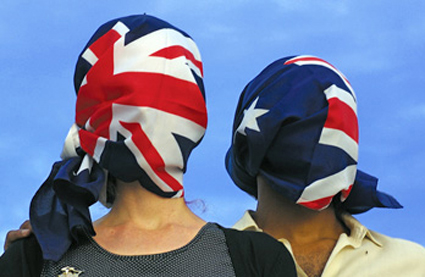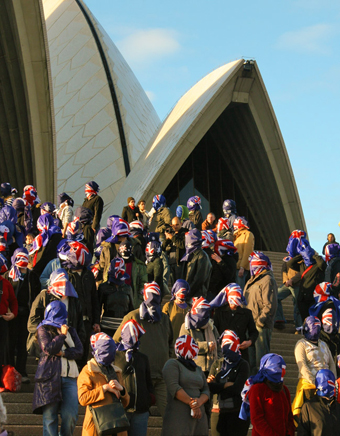 |
Muffled Protest photo boat-people.org |
THE 2010 FEDERAL ELECTION CAMPAIGN HAS BEEN DISGRACEFULLY NOTABLE FOR THE ZERO LEVEL OF LABOR AND COALITION ENGAGEMENT WITH ART, SCIENCE, SPORT (NOW, LIKE ART, CHARGED WITH ELITISM BY THE CRAWFORD REPORT) OR AUSTRALIA'S ABORIGINAL POPULATION. PETER GARRETT IS AN INVISIBLE ARTS MINISTER. TO DATE, ONLY THE GREENS HAVE PROMISED NEW INVESTMENT IN THE ARTS. BUT IT'S THE CULTURAL POLICY ISSUE WHICH EMERGED WELL BEFORE THE ELECTION CAMPAIGN AND WILL LONG OUTLIVE IT.
Peak Arts organisations (gathered together under the ArtsPeak banner), ABC Radio National arts programs and, especially, Marcus Westbury and Ben Eltham of the Centre for Policy Development ("Sharing the Luck: Cultural Policy in Australia" http://morethanluck.cpd.org.au/sharing-the-luck/cultural-policy-in-australia/) have prompted artists and the general public to apply pressure to the parties to embrace the arts in their election policies.
new directions, different paths
The greatest emphasis has been on the need for a national cultural policy with Westbury and Eltham pushing the notion in new directions, if divisively—demanding redistribution of funding from the major performing arts organisations (Opera Australia in particular) to the small to medium sector including areas like design, computer gaming, graphic arts, animation and others hitherto associated with an 'underground' not interested in funding (or engagement with government) or the creative industries that have one foot planted, if often lightly, in the commercial landscape. Westbury has written: "It is easy to argue that such people do not need funding. It is probably a reason for their relative vitality that they don't. But that does not mean that they are without needs or that we can simply pretend that they do not exist" ("Evolution and Creation: Australia's Funding Bodies," Meanjin, Vol 68, No2, 2009).
It's a pity that instead of arguing for greater funding overall for the arts and that the government ought to reconsider what comprises the arts (under the broader rubric of culture), Westbury and Eltham implicitly exhort the arts to instead turn on itself. Likewise, the writers problematically set up the Australia Council for the Arts as the target for their dissatisfaction with the status quo. As Christopher Madden argues eloquently on Arts Hub ("In defence of the Australia Council," August 2 http://www.artshub.com.au/au/news-article/opinions/architecture-and-design/in-defence-of-the-australia-council-181853?sc=1), government itself—the Department for the Arts—is the more apt target. "If Australia’s cultural policies are a shambles, then the real source of the problem is central government, represented by the bureaucratic behemoth that is the Department. By international standards, the Department is not doing all it should be doing, and is doing many things it shouldn’t. This is hardly surprising for an agency in which arts and heritage are subsumed by such momentous portfolios as environment and water."
Westbury and Eltham call for the dissolving or reform of the Australia Council (the two have different views on this: see the response pages at the end of their paper) and the establishment of a new cultural agency with whole of government management of culture (linking the arts with health, education, urban planning etc), resonating with the demands coming from ArtsPeak and others. To be effectively realised, Madden argues, an internal government agency would be needed to make this work—not one at arm's length from it: "Proper engagement from within central government would let the Australia Council get on with what it does best, being an arts council." Yes, but how are artists to have input into the making of arts policy in an increasingly top down political climate? Through ArtsPeak and consultative committees? A national cultural policy should include a guarantee of artist consultation in respect of policy realisation: but how would that be made effective?
inclusiveness & divisiveness
The strength of the Westbury and Eltham policy paper otherwise lies in its inclusiveness: recognising culture as more than the arts (or is it really a broader notion of what comprises art); abandoning "the false divide between high art and popular culture"—particularly apt in a time of unpredictable and innovative change; and "cutting the red tape that affects culture" to allow artists to access low rent work places and capital. The latter involves "putting in place policy settings that allow [artists] to perform, present and produce with limited capital [and] is more important (and effective) in ensuring their success than direct subsidies." This last proposition could be comfortably adopted by the slash and burn Coalition.
On the other hand, the writers also propose funding "artists and productions, not institutions." This reads like a radical proposal on behalf of underpaid artists but it fails to acknowledge rank and file orchestral players, choruses, ballet and contemporary dancers and actors and theatre support staff (set builders, stage hands, technicians etc) who comprise a large part of Australia's arts ecosystem, many of whom are not exclusively involved in heritage arts. While we might be shocked at the per seat subsidy for an opera ticket (and at the high ticket cost for many opera lovers who are not well-off) it would be negligent to ignore the very nature and complexity of arts institutions, let alone the benefits of the outreach programs of some of the larger ones.
 |
Around 70 people joined Muffled Protest on Saturday, August 2, 2010 "to show up the blind nationalism and xenophobia fueling the fear rhetoric surrounding refugees and asylum seekers." photo boat-people.org |
cultural and economic reciprocity
It is undeniable that the small to medium sector has been consistently underfunded relative to its larger peers (and their recurrent rescue packages) and that this needs to be addressed, but funding redistribution would be a crude and cruel tool. Increased funding is vital, consistent with national economic growth and reciprocating artists' contribution to the Australian economy—"While nine out of 10 Australians participate in the arts, the federal government invests in this area less than one per cent of its expenditure overall," ArtsPeak).
New funding should not come in the form of one-off initiatives but as part of a coherent national cultural policy, one that acknowledges the need for consistent funding and other strategies outlined by Westbury and Eltham, ArtsPeak, Throsby and others. A national cultural policy should entail, for the arts, whole of government engagement, education in the arts for all, protection of artists' rights, a reassessment of the scope of the arts, the introduction of tax incentives and social security for artists, the collection and analysis of "adequate statistical and qualitative data that identifies both economic and social return on investment," "forging a national research agenda for arts and culture based on policy development and private investment" and the protection of Australian culture "in the context of international trade agreements" (ArtsPeak).
the greens & the arts
The Greens' latest election policy anouncement is responsive to key areas of development—R&D, national access and export. It includes a proposal to invest $5m in a research and development fund for new work; $10m in overseas touring; and additional funds for regional touring. As well the Greens promise to improve artist incomes through a copyright issue consultation, "Centrelink recognition of engagement in art as part of a dole recipient's mutual obligation requirement," revision of the Resale Royalty Scheme and the institution of a $3 million Artists’ Fund to assist publicly funded galleries to pay artists' fees (Australian Financial Review, Aug 13). These Greens initiatives go some way to establishing in practical terms some of the principles that might be integral to a national cultural policy.
For a brief guide to books, essays and online material go to: A short guide: national cultural policy
Boat-people.org is an art gang which has been making work around race, nation, history and borders since 2001. The group's current work, Muffled Protest, is a distributed expression of dismay in cities around Australia. You can participate! See www.boat-people.org
RealTime issue #98 Aug-Sept 2010 pg. web
© Keith Gallasch; for permission to reproduce apply to [email protected]








 back
back